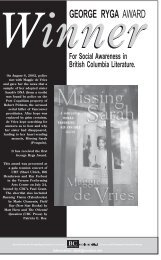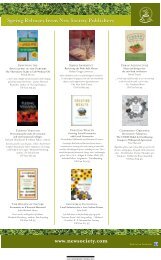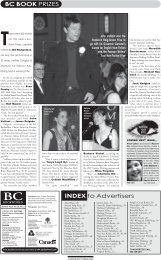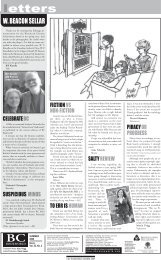Autumn 2011 Volume 25 - No 3 - BC BookWorld
Autumn 2011 Volume 25 - No 3 - BC BookWorld
Autumn 2011 Volume 25 - No 3 - BC BookWorld
Create successful ePaper yourself
Turn your PDF publications into a flip-book with our unique Google optimized e-Paper software.
24 <strong>BC</strong> BOOKWORLD AUTUMN <strong>2011</strong><br />
LIBRARIES, eBOOKS & YOU<br />
continued from page 23<br />
PW: The French always have valued<br />
their culture.<br />
<strong>BC</strong>BW: And the Dutch are now digitizing<br />
every Dutch book, pamphlet, and<br />
newspaper produced from 1470 to the<br />
present. The Japanese Diet has voted for<br />
a two-year, 12.6 billion yen crash program<br />
to digitize their entire national library.<br />
Are Canadians lagging “behind”<br />
Europe in your view Or are we right to<br />
be cautious<br />
PW: It’s not really caution, it’s respecting<br />
the law. Right now, we can’t digitize<br />
a local newspaper that ceased to publish<br />
in the 1950s because of copyright. The<br />
Dutch negotiated an agreement with<br />
their publishers to enable the digitization<br />
of “orphan works” [books still under<br />
copyright protection but not commercially<br />
available and the copyright owner<br />
can’t be traced]. When you have a relatively<br />
small group of publishers publishing<br />
in a language not widely spoken, such<br />
agreements are much easier.<br />
<strong>BC</strong>BW: Many individual writers feel<br />
the emergence of eBooks is a juggernaut<br />
and they are losing control of their work.<br />
Who is looking after their interests<br />
PW: Every sector is nervous about loss<br />
of control and what the digital future<br />
will mean for their survival. For instance,<br />
with digital content, libraries can now<br />
effectively be denied the right to add<br />
content to their collections which is otherwise<br />
commercially available. Authors<br />
and publishers can dictate what digital<br />
works are sold to libraries and under<br />
what terms and conditions the work can<br />
be made available to our users. If they<br />
think availability of their work in libraries<br />
is detrimental to their economic interests,<br />
through licences they can dictate<br />
that the work must be sold for individual<br />
private use only and not for lending by<br />
libraries.<br />
<strong>BC</strong>BW: Digitization has thus far most<br />
radically affected university libraries, has<br />
it not<br />
PW: Digital collections are now dominant<br />
in university and college library<br />
collections. That change reflects both the<br />
nature of academic publishing and the<br />
computer savvy user population. There<br />
are now discussions taking place which<br />
refer to “heritage print collections” of<br />
books to be stored in collaboratively-run,<br />
remote, storage centres. Libraries could<br />
concentrate on digital collections to be<br />
selected and licence-negotiated by a consortia<br />
of libraries, often national in<br />
scope.<br />
<strong>BC</strong>BW: Aren’t they planting the seeds<br />
of their own destruction<br />
PW: They would argue that this approach<br />
is a pragmatic response to<br />
changes in publishing and the needs of<br />
students and faculty who often prefer<br />
the convenience of digital content in a<br />
“learning commons” approach to physical<br />
space in post-secondary libraries.<br />
<strong>BC</strong>BW: Currently the library in Prince<br />
George has to pay the same amount for<br />
a book as the library system in Toronto<br />
that serves 2.5 million people. Can<br />
eBooks introduce a more equitable price<br />
model<br />
PW: The concept of licencing digital<br />
content using per capita service population<br />
to set the price is well established<br />
with electronic magazine and newspaper<br />
databases. Libraries could have a<br />
menu of purchase options for eBooks<br />
with the price determined by a range of<br />
variables: how long do you have the<br />
book in your collection how many people<br />
can read it simultaneously how<br />
many total “loans” are permitted what<br />
is the size of your user population We<br />
are still in the very early days of coming<br />
to terms with how to deal with this to<br />
address the needs of all parties.<br />
<strong>BC</strong>BW: Should libraries pay more for<br />
an eBook than for a regular book And<br />
what is the situation with publisher profits<br />
and author royalties<br />
PW: These are important issues. Clearly<br />
there are advantages to libraries with<br />
eBooks; they don’t wear out or get lost,<br />
they don’t have to be moved around,<br />
labeled, emptied from the night return<br />
box etc. This could be a justification for<br />
libraries paying more. Publishers have<br />
lower costs due to no need for physical<br />
warehousing and shipping but they have<br />
been challenged by the insistence of<br />
monopoly distributors such as Amazon<br />
and Apple that retail prices are low.<br />
Authors appear to be receiving lower<br />
royalties in dollars from eBook sales, in<br />
part due to the lower list price. This is<br />
all a work in progress but it will get sorted<br />
out.<br />
<strong>BC</strong>BW: Even though Amazon now<br />
sells more eBooks than print books, public<br />
libraries remain fairly conventional.<br />
PW: True. While eBook use is growing<br />
quickly in society, it is still very small compared<br />
with the borrowing of print books.<br />
The spring survey we carried out for the<br />
Public Lending Right Commission in<br />
large urban public libraries indicated that<br />
in January and February of <strong>2011</strong> eBook<br />
circulation in those libraries was less than<br />
2% of print book circulation.<br />
<strong>BC</strong>BW: Ray Bradbury’s Fahrenheit<br />
451 imagined a hedonistic, anti-intellectual<br />
America, around now, when books<br />
were being burned. The antiquarian<br />
bookseller Don Stewart believes we are<br />
undergoing a 21st century equivalent of<br />
Fahrenheit 451—and libraries are<br />
complicit.<br />
PW: I would say there is a big difference<br />
between seeking to suppress writing,<br />
as in Fahrenheit 451, and in seeking<br />
to increase access to writing through<br />
digitization. The impetus behind many<br />
of the digitization projects underway is<br />
fundamentally democratic. The contentious<br />
issue is how libraries deal with the<br />
overwhelming book glut confronting us<br />
all. The harsh reality is that there are too<br />
many books in the world and they keep<br />
coming in unsustainable waves. Libraries<br />
have always discarded low-use titles<br />
in order to make room. We have to ensure<br />
that the right decisions are made<br />
when this is happening. Don has no<br />
doubt seen situations where libraries are<br />
getting rid of titles which he thinks are<br />
worthwhile.<br />
Paul Whitney with one of his favourite authors Joy Kogawa, 2008<br />
<strong>BC</strong>BW: Margaret Atwood says “The<br />
librarian is the key person you don’t<br />
want to remove from a school.” What is<br />
the future of the teacher librarian<br />
PW: I agree with her, but I am not optimistic<br />
when it comes to the future of the<br />
well-staffed school library. The only way<br />
this can change is from political leadership<br />
at the provincial level which makes<br />
school libraries a priority in labour negotiations.<br />
We’ll see how things play out this<br />
fall with the <strong>BC</strong>TF contract negotiations.<br />
The necessity of an appropriately staffed<br />
and stocked school library should be<br />
raised with your local MLA. The<br />
Internet alone is not an acceptable replacement.<br />
<strong>BC</strong>BW: Orca Books in Victoria now<br />
offers more than 400 of their own titles<br />
in digital format. Readers can purchase<br />
a “multi-user digital subscription” for<br />
children’s books. But their level of adaptation<br />
to the digital environment is<br />
abnormal in Canada, is it not<br />
PW: Yes. Orca and several other publishers<br />
are to be applauded for wading<br />
in and making an effort. eBook readers<br />
were marketed here [in Canada] later<br />
and publishers were slower to distribute<br />
their content than in the U.S.<br />
<strong>BC</strong>BW: Do you think the eBooks trade<br />
will eventually gravitate towards a single<br />
use device, such as Kobo Or a multiuse<br />
device, such as the iPad<br />
PW: I expect there will continue to be<br />
a place for the dedicated eReader which<br />
offers a more aesthetically pleasing reading<br />
experience, and that there will also<br />
continue to be many readers who choose<br />
to use other hand-held devices to access<br />
eBooks.<br />
<strong>BC</strong>BW: One of the biggest questions<br />
is: Will eBooks deliver new markets or<br />
are they just repositioning readers in a<br />
different format<br />
PW: The potential exists to deliver new<br />
markets but this doesn’t appear to be<br />
happening to any extent as yet. The U.S.<br />
January–April publishing revenues<br />
showed print down 19% and eBooks up<br />
163% with a combined first quarter<br />
decline of 4%. As these are dollar<br />
changes, it does not mean that fewer<br />
books are being purchased because<br />
eBooks most often sell at a lower<br />
price.<br />
<strong>BC</strong>BW: Mike Shatzkin, CEO of book<br />
consulting company Idea Logical, claims<br />
overall shelf space devoted to printed<br />
books in the U.S. dropped 15 percent<br />
over the past year. He claims it will only<br />
take about three years for stores to cut<br />
space for printed books by 50%.<br />
PW: Well, this sounds reasonable to<br />
me. Chapters notified Canadian publishers<br />
late last year that they would be<br />
reducing shelf space devoted to books<br />
by <strong>25</strong>% and this certainly seems to be<br />
happening. Combine this with bookstores<br />
closing and it is not a pretty picture.<br />
<strong>BC</strong>BW: Are all types of books equally<br />
successful as eBooks<br />
PW: Genre fiction sells particularly well<br />
as eBooks. This is borne out by the fact<br />
that the biggest decline in print sales has<br />
been with mass-market paperbacks—<br />
down 41% in April in the U.S. In 2010,<br />
romance and historical sagas comprised<br />
14% of the global eBook market, 7 times<br />
their share of the print market. Science<br />
fiction and fantasy have a three times<br />
greater share of the eBook market than<br />
the print market.<br />
<strong>BC</strong>BW: So what will our libraries look<br />
like ten years from now And will there<br />
be fewer librarians<br />
PW: I believe public libraries will still<br />
be thriving in 2021. They will still be<br />
recognizable as libraries to anyone walking<br />
in from <strong>2011</strong>, or 1970, for that<br />
matter. There will still be staff but the<br />
focus of some work will change. While<br />
the personal contact between staff and<br />
library user will remain important, I anticipate<br />
our users will be more self-sufficient.<br />
The staff number question will be<br />
subject to both operational changes—<br />
some adopted willingly and some possibly<br />
imposed—and at the end of the day<br />
the outcome will be determined by political<br />
will at the local level and global<br />
economic forces.<br />
As we are currently seeing in the UK<br />
and California, if the money runs out,<br />
library service suffers. The political<br />
musings currently taking place in Toronto<br />
on closing library branches and<br />
outsourcing library services should serve<br />
as a warning that complacency regarding<br />
local politics is not cool.<br />
While we are seeing unprecedented<br />
change, I believe that writers will continue<br />
to write and readers will continue<br />
to read. The intermediaries, publishers,<br />
retailers and libraries, will experience<br />
greater change, some of which will be<br />
wrenching, but they will still have a role<br />
to play.<br />
<strong>BC</strong>BW: And what do you think is the<br />
future for B.C. <strong>BookWorld</strong><br />
PW: Irreplaceable!
















